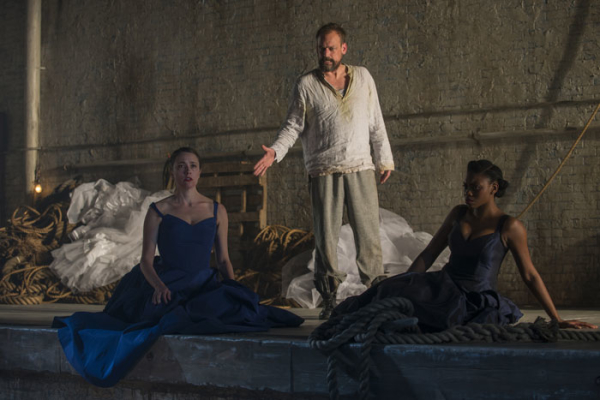Iphigenia in Aulis

(© Michael Brosilow)
The source material dates back thousands of years. But in staging Nicholas Rudall's riveting new adaptation of Euripides Iphigenia in Aulis, Court Theatre pulls the audience into an emotional vortex that's as urgent as tomorrow's headlines and as violently relatable as a Thanksgiving Day meltdown among family members whose close proximity brings out the worst in them.
Far more than just a compelling drama of a family in crisis, Iphigenia in Aulis, directed by Charlie Newell, is a thrilling, darkly cinematic exploration of life's thorniest quandaries, those snarled, unanswerable questions that can leave you wide awake in the middle of the night and haunted through the day.
Euripides' classic tragedy is both a triumph of broad strokes and intensely detailed specifics. At curtain up, we meet King Agamemnon (Mark L. Montgomery), grimy, exhausted, and hollow-eyed with desperation. The Trojan War is raging, but Agamemnon and his army are stranded in Aulis, the victim of cruel gods who have stilled the winds and harbored his ships in a dead-calm ocean. The good news: The gods are willing to make a deal in exchange for favorable winds. The horrific news: The terms are gasp-inducing in their uncompromising cruelty. The price Agamemnon must pay in exchange for favorable winds is the ritual slaughter of his beloved daughter, Iphigenia (Stephanie Andrea Barron). The dilemma leaves the king reeling, his face scourged with torment.
Newell's cast creates a surging momentum that pulls the audience along with the force of a riptide. As Agamemnon, Montgomery is both physically imposing and scoured down to primal version of humanity, a flashing knife blade of a man pursued by relentless, merciless powers he has no power over.
He's matched by the formidable intensity of Sandra Marquez as Iphigenia's mother, Queen Clytemnestra. Marquez is a stunner as she embodies the rage and terror of a woman faced with a husband planning to kill her beloved daughter. A regal, even haughty woman at the onset, Clytemnestra rails with the emotional violence of the Furies, but in the end, she's confronted with her own, utter impotence. As for the doomed title character, Barron's emotional arc is steep. Starting out as a giddy, joyfully girlish ingenue, she evolves into a clear-eyed martyr willing to march unhesitatingly to her own murder. Barron is effective on both ends of the spectrum.
The sole misstep in Newell's direction comes in his treatment of the chorus, whom he has outfitted in elaborately poofy aquamarine bubble dresses. Their words – many of them gorgeously sung – are poetry. Their look (by costume designer Jacqueline Firkins) is 1980s bridesmaid.
Scott Davis' spare, weathered set is littered with the rusting lengths of chain, whorls of heavy ropes, and other detritus that call to mind battered warships. And when the wind finally picks up in the final moments, the visual will set the hair on the back of your neck on end.
The first in a planned trilogy of translations by Rudall, to be followed in the coming years by Aeschylus' Agamemnon and Sophocles' Electra, Iphigenia in Aulis will leave you hungering for the next installment.











